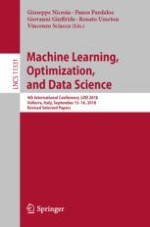2019 | OriginalPaper | Chapter
User Preferences in Bayesian Multi-objective Optimization: The Expected Weighted Hypervolume Improvement Criterion
Authors : Paul Feliot, Julien Bect, Emmanuel Vazquez
Published in: Machine Learning, Optimization, and Data Science
Publisher: Springer International Publishing
Activate our intelligent search to find suitable subject content or patents.
Select sections of text to find matching patents with Artificial Intelligence. powered by
Select sections of text to find additional relevant content using AI-assisted search. powered by

